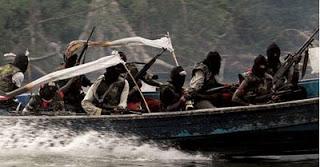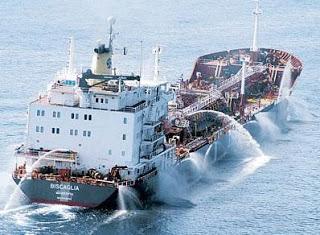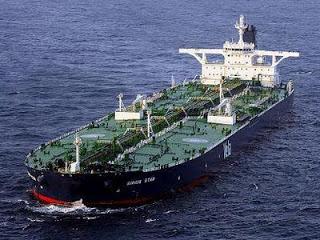Pirates for long were thought of as ‘one eyed jacks, colourful vagabonds’ who would strike at will and capture mercantile boats carrying cargo.

The modern world still have them in large numbers as brazenly displayed by Somali pirates causing havoc in the Gulf of Aden, one of the world's busiest shipping lanes, which connects Europe to Asia and the Middle East via the Suez Canal. There has been alarming increase in the attempted attacks, those averted and successful sea jackings. When a ship is attacked by pirates, great effort is naturally focused on the human aspect of the problem. Often the contractual and technical issues are very much a secondary interest when faced with an initial emergency. Again, here when we read of Piracy – we do not attach them to be as empowered by any State or authority but carried out by groups of individuals acting for personal gain, in which case they are to be considered as pirates for marine insurance purposes.
A chemical vessel trying to employ water cannons to ward off the pirates from getting on board
 The Liberian flagged 30000 ton VLCC Sirius Star was a bounty for the pirates. This vessel which could dwarf aircraft carriers has 2,000,000 barrels capacity of crude oil when fully loaded. Upon capture of this vessel, pirates demanded US $ 25M ransom but reportedly settled for GBP 2 M which reportedly was air dropped by parachutes. Below is a photo of the tanker vessel Sirius Star
The Liberian flagged 30000 ton VLCC Sirius Star was a bounty for the pirates. This vessel which could dwarf aircraft carriers has 2,000,000 barrels capacity of crude oil when fully loaded. Upon capture of this vessel, pirates demanded US $ 25M ransom but reportedly settled for GBP 2 M which reportedly was air dropped by parachutes. Below is a photo of the tanker vessel Sirius Star
Here are some of my thoughts on the aspect of loss or damage arising out of piracy and how they would be treated by the Underwriters.
From the Insurers’ angle, am not sure of the losses suffered as though the vessels had been held captive, not much loss and resultant claim of cargo seems to have been reported. Many would consider piracy to be a war risk. Understand that Norwegian Marine does not make any distinction. The perils clause of the predominately used Institute hull clauses (1983) includes "Piracy". The intention is to embrace the likes of - violent acts of persons who board the vessel with an intention to steal. Cover would include damage to or loss of the vessel. But when it comes to cargo coverage, we are most often guided by the Institute Cargo Clauses of ILU. Here is something extracted from the clauses that We, the Indian Insurers use.
As it is, we have Clauses ICC A, B & C. Whilst the first one is exclusion driven, rest are named peril policies. It is obvious that ‘piracy’ is not a named peril in B &C. The War exclusion under ICC A would read under : (emphasis added by yours truly)6 In no case shall this insurance cover loss damage or expense caused by6.1 war civil war revolution rebellion insurrection, or civil strife arising therefrom, or any hostile act by or against a belligerent power6.2 capture seizure arrest restraint or detainment (piracy excepted), and the consequences thereof or any attempt thereat6.3 derelict mines torpedoes bombs or other derelict weapons of war. Though the wordings are other wise similar in ICC B & ICC C exclusion, significantly, under 6.2 the words piracy excepted is missing.As we all admit, this is an exclusion which can be covered on payment of additional premium and upon payment of additional premium, Instt. War clauses would attach. The risks covered under this clause reproduces what is excluded under 6 of ICC B & C and hence even when this cover is bought, there seemingly would be no coverage for the piracy related perils.Next, though there could be damages to cargo arising out of delay, this per se would not stand covered going by the specific exclusion contained in the Institute Cargo Clauses. Though I do not have firsthand information / confirmation on GA being declared by the ship that has been captured by the Pirates, there are some views floating that the ship owners could indeed stake claim for the ransom amounts paid.Initial thought would summarily dismiss it stating that ransom is not a legally accepted one and hence there would not be any coverage. The question of legality may get a different interpretation if the captors are an overtly political or terrorist organisation. There are also views that payment of ransom is not illegal under English Law after the repealing of 1782 Ransom Act. Going by the common principle of General Average entrenched that there would GA act when and only when any extraordinary sacrifice or expenditure is intentionally and reasonably made or incurred for the common safety for the purpose of preserving from peril the property involved in the common marine adventure, payment of ransom for release of vessel might seem to be within the purview of the GA, as the loss is imminent, inevitable and actually made.Thus to conclude, there is imminent and urgent need for the cargo owners - insured(s) to check whether their insuring terms do cover ‘acts of piracy’ – if the coverage were not on ICC A terms. As for ransom, though there are some instances of such payment, declaration of General Average appears not to have been practiced. Look forward to your views and feedback on this articleWith regards - S Sampathkumar.A mail shared with my group on 23rd Jan 2009 & posted on my blog now. – not much has changed since

